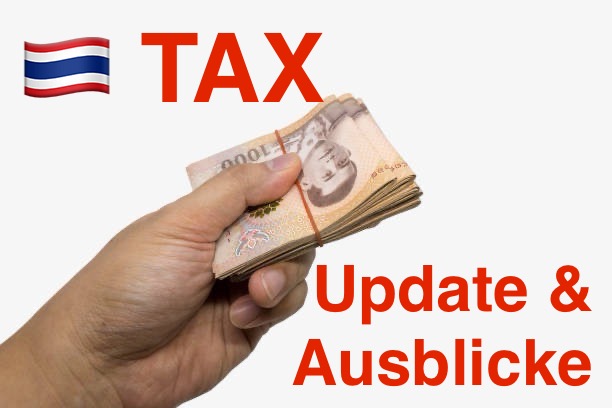Taxes Thailand update & preview
Risen fuss about taxes has caused quite a stir here. Taxes Thailand update & preview, a vicious circle – if you like.
The planned change to the law is still in its infancy and must first be approved by the Thai cabinet and parliament. It is therefore likely to be some time before it is finally implemented.
This article does not constitute tax advice and cannot replace such advice. If you require specific advice, please contact a suitably qualified professional, such as a tax advisor.
A royal decree brings hope
Income earned abroad in 2025 and transferred by the end of 2026 will remain tax-free. This news is a great relief for many Germans who are enjoying their retirement in Thailand. But how long will this relief last?
Thailand, a paradise for retirees and expats, is making headlines in 2025. The government is planning to relax the tax rules for foreign income. Since 2024, people who live in Thailand for more than 180 days a year have had to pay tax on remittances from abroad.
Pensioners are relieved
Many German pensioners in Thailand were in turmoil as they feared that their pension would no longer be enough. The 2024 tax reform forced many to replan their finances. But the new rules for 2025 could bring relief.
Income from past times
Income earned before 2024 remains fully tax-free, regardless of when it is transferred. The Ministry of Finance has issued this clarification to eliminate uncertainty. So anyone bringing savings or old pension payments to Thailand need not fear tax. This is a small victory for the expat community.
The reason for the change in Thailand’s tax policy is the lack of money. Since January 2024, the country’s revenue has declined. Wealthy Thais in particular, who brought income from abroad to their home country, have held back investments.
This reluctance has slowed down the economy. By relaxing the tax regulations, the Ministry of Finance wants to create incentives to bring money into the country.c
Who really benefits from these new rules?
The new rules apply to all tax residents, both Thais and foreigners who spend at least 180 days in Thailand. This is a good decision, as discrimination only against expats would have caused trouble internationally.
Holders of the Long-Term Resident (LTR) visa, which offers tax advantages, could particularly benefit. However, many Germans with simple retirement visas remain skeptical. Although the tax exemption until 2026 is a relief, the language barrier and bureaucracy remain.
Will I get back any taxes I have paid?
Good news for 2024: Those who have already paid taxes on remittances could apply for refunds. Many expats paid 10,000 to 20,000 baht (approx. 250-450 euros).
However, the application is complicated. Documents must be translated and proof must be provided that the income was earned before 2024. German documents are often not accepted, which increases the cost of translations. Expats should therefore inform themselves in good time so as not to miss any deadlines.
Visa and tax ID?
Müssen alle Expats jetzt eine Steuer-ID beantragen?
No, experts emphasize that only people who work legally in Thailand are required to submit tax documents. Many retirees with Privilege Card Elite or other long-term visas spend less than 180 days in the country and are therefore not considered tax residents.
However, it is important to note that those staying longer will need to apply for a tax ID. The Thai authorities are considering linking visa extensions to tax IDs. Expats should therefore inform themselves carefully about the 180-day rule, as there are some pitfalls here.
Was bedeutet das für Rentner?
As already mentioned, the royal decree expected shortly should provide final clarity, but until then the uncertainty remains: Will the rules actually be followed? You should therefore keep an eye on your finances and keep all receipts so that, in case of doubt, you can prove that the money from the transfers comes from old income.
International standards
Thailand wants to adapt its tax system to international standards. The automatic exchange of information is intended to make income more transparent. Some expats fear that this is an attack on them, but this is not the case. Thailand merely wants to keep pace with OECD standards. Whether this is a good decision is not for me to judge, nor is it for me to judge.
Double taxation agreements help to avoid double taxation. However, implementing them can be difficult. Anyone who has already paid taxes abroad must provide proof of this. Without clear evidence, there is a risk of back payments. Expats should check their finances now to avoid unpleasant surprises.
The big question is what happens after 2025. From 2027, transfers from 2025 could become taxable again. The Ministry of Finance has not yet commented on its long-term plans. It’s a vicious circle.
What we definitely need is a clear and comprehensible legal basis. That will probably be the biggest challenge.
Link to support / donation for the channel
PayPal Link
Bank transfer, Bitcoin and Lightning
#Thailand #Taxes #TAX #IncomeTax #TaxExpats #Expats #TaxesThailand #TaxReformThailand



